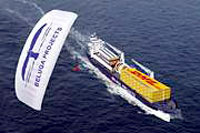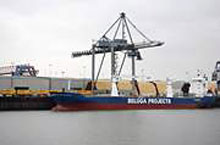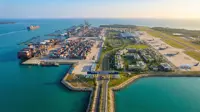DHL to ship 10,000 tons across the Atlantic on wind powered ocean liner
By Our Corporate Bureau | 19 Jan 2008
The Beluga Shipping-owned MS Beluga SkySails, the world's first cargo vessel with an innovative towing kite system will sail from Germany to Venezuela next week. Developed by Hamburg-based SkySails, the unique windpropulsion system is being used in commercial transport for the first time.
It will carry the first part of a complete particleboard factory across the Atlantic, from Bremen in Germany to Venezuela, South America, on behalf of DHL Global Forwarding, the ocean and airfreight arm of the Deutsche Post World Net Group.
The multipurpose vessel will set sail early next week. What makes it so special is a new wind propulsion system with a huge towing kite that provides additional thrust to the ship at sea - a sustainable solution for reducing fuel consumption, costs and emissions.
Once the diesel-powered ship is out at sea, it will unfurl a an especially designed flying sail to supplement its engines with wind power. A computer will adjust the height and the angle of the sail, developed over a period of four years by Hamburg-based SkySails.
Similar to the concept of paragliding, SkySail says its technology, which exerts the force of a tug, can be retrofitted to almost all existing cargo ships.
First-rate quality
 |
| MS Beluga SkySails with the innovative towing kite system. |
Claus Krüger, director at DHL Global Forwarding and responsible for project group Germany, says, "Besides offering our customers first-rate quality in ocean and air freight transports, we are always mindful of the increased need for sustainable logistics solutions. The Beluga SkySails is a forward-looking example of how to implement low-emission ocean freight transports. The promising environmental aspects of the new SkySails System were a major factor in our decision for this charter."
DHL says it has made it its business to provide customers not only efficient logistics services but sustainable transport solutions as well and is increasingly using alternative propulsion systems such as biogas and electric motors. Its business customers in Europe can opt to send their shipments with DHL's carbon-neutral GoGreen service that helps them offset the CO2 emissions caused by the carbon dioxide emitting transportation.
Almost 95 per cent of global trade is conducted by sea. With a growing requirement for shipping to keep pace with the expansion in global trade, the shipping industry's dependence on oil-based fuels will keep rising - so will the pollution levels caused by the industry.
Shipping already accounts for 3 per cent of global carbon dioxide emissions or up to 900 million metric tons, 10 per cent of global sulphur dioxide, 30 per cent of nitrogen oxides apart from huge amounts of soot.
Accordingly, companies relying on ships in their supply chain are increasingly concerned about carbon emissions and the huge fuel costs.
Wind is cheaper than oil
 |
| The MS Beluga SkySails in Bremen's Neustädter Harbour. |
The ship is based on the simple principle that wind is cheaper than oil and, at sea, the most inexpensive and cleanest source of energy. The wind propulsion system, which features a towing kite measuring up to 320 square metres, was developed by Hamburg-based firm SkySails and will now be used on ocean-going vessels for the first time.
Depending on the wind conditions, fuel costs can be lowered by between 10 and 35 per cent. A small, 87-metre-long freighter would thus save an average of €280,000 in fuel costs per year.
DHL Global Forwarding loaded MS Beluga SkySails at Neustädter Harbour with parts of the factory supplied by Dieffenbacher, based in Eppingen, Baden-Württemberg.
Krüger says, "In its first partial shipment, the vessel is transporting about 10,000 freight tons from Bremen to Guanta, Venezuela. The route across the Atlantic will take a good two weeks."
The crew of Beluga, led by captain Lutz Heldt, has been undergoing intensive training for the voyage in the last few months, including the handling of the auxiliary wind propulsion system.
Heldt is thus confident that, "Besides making transoceanic transport safer, the new auxiliary propulsion system also makes it more profitable and eco-friendly: depending on the wind conditions. We're expecting a fuel saving of between ten and 20 per cent - assuming wind conditions are favourable."
Added Krüger, "With the Beluga SkySails' first-ever commercial voyage, DHL, the biggest logistics company on the planet, is again playing a pioneering role in using innovative technologies and sustainable logistics - an aspect that is becoming increasingly important to our customers."


















